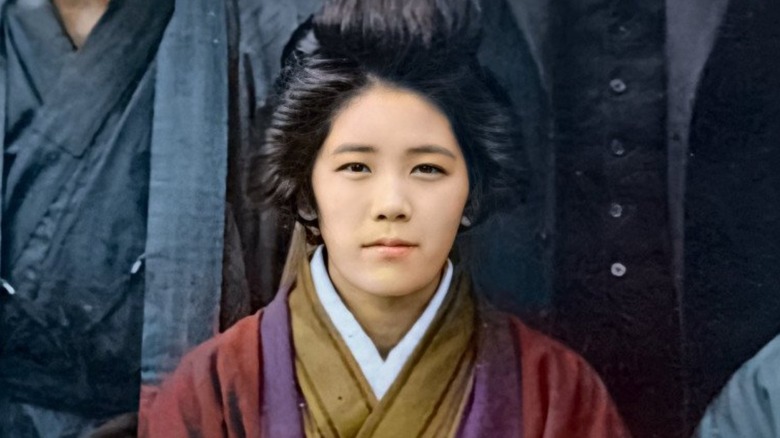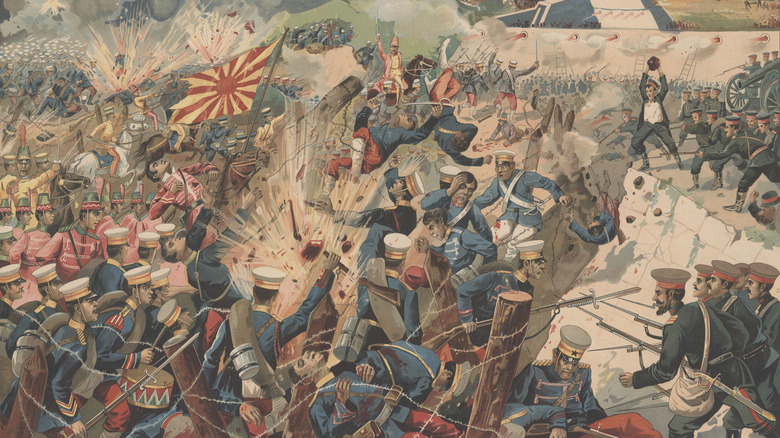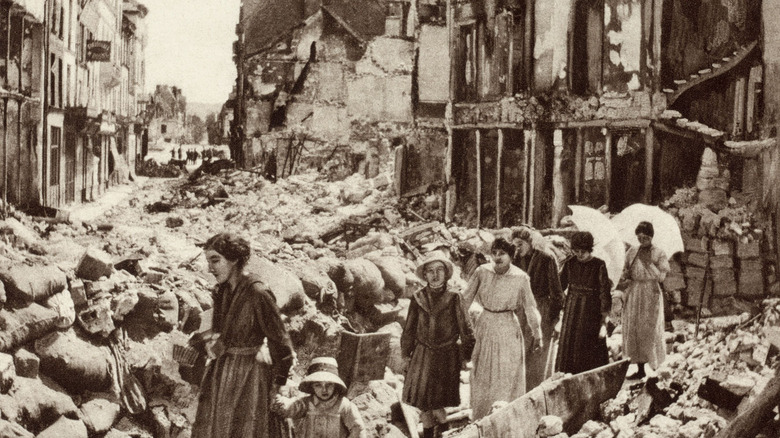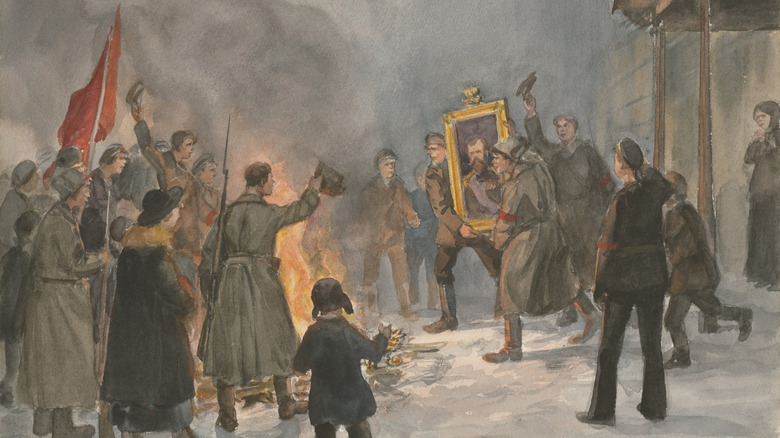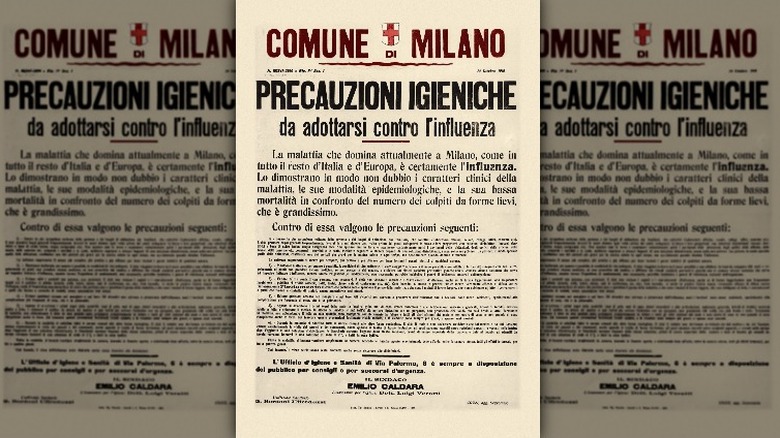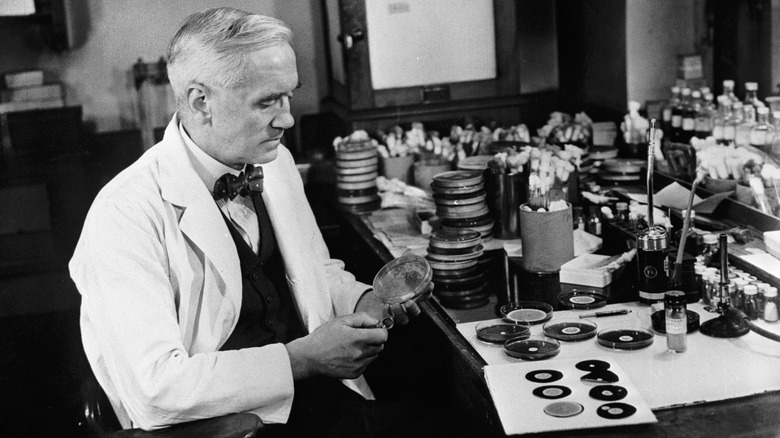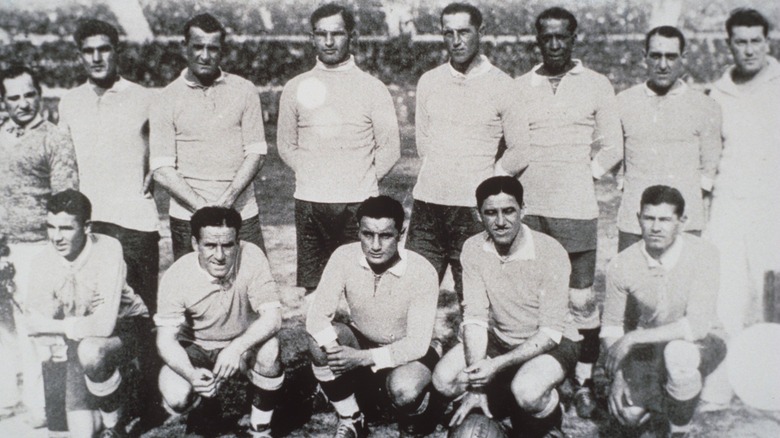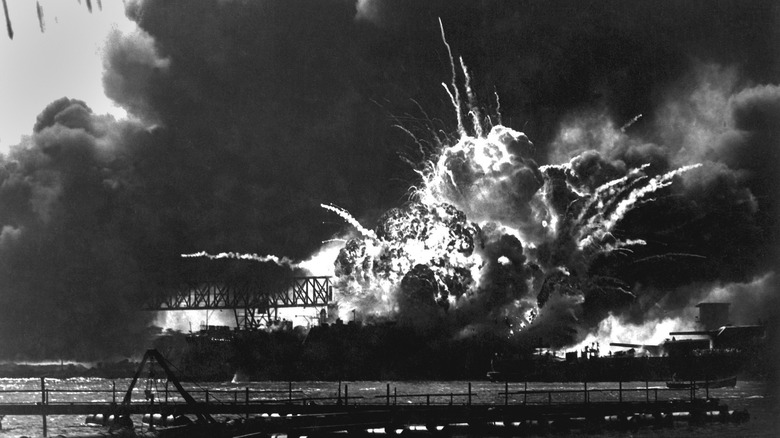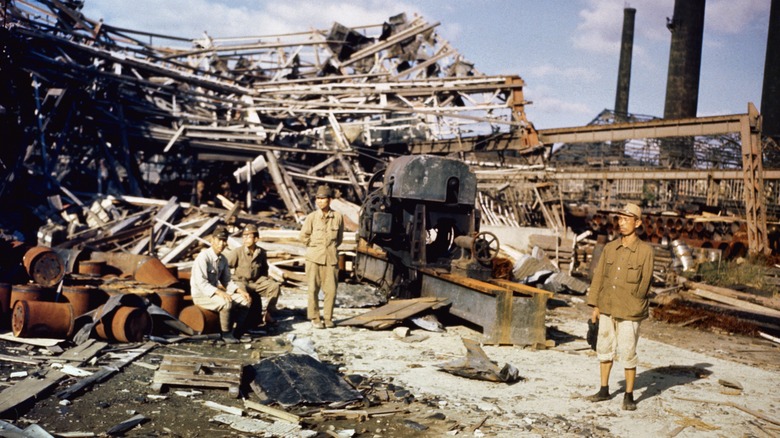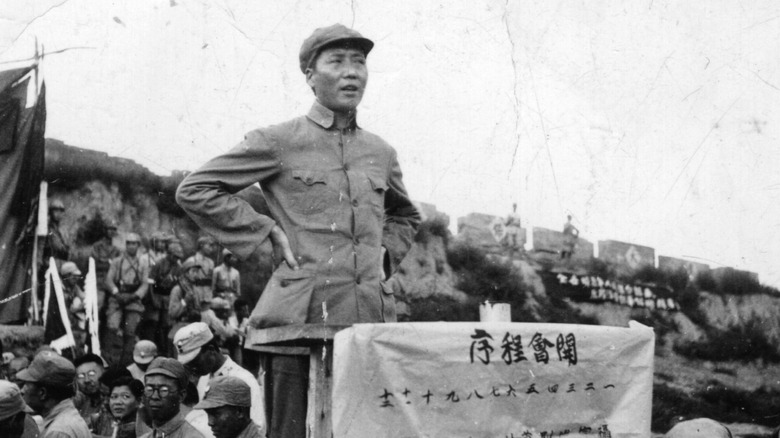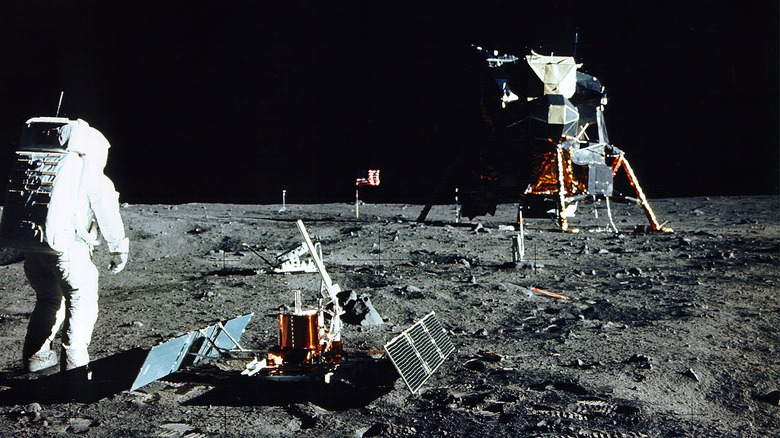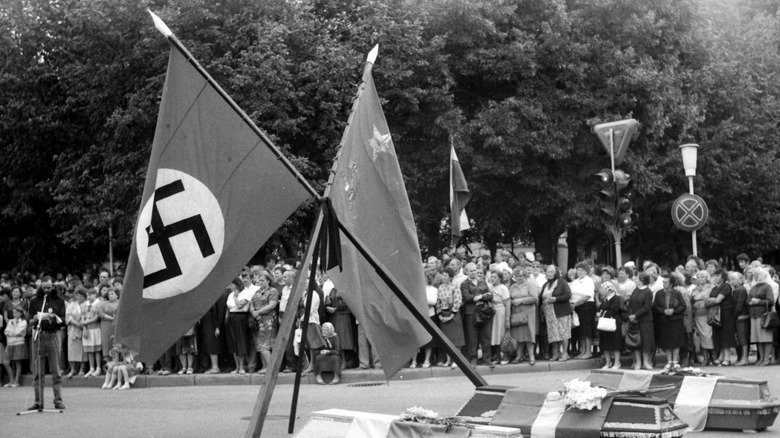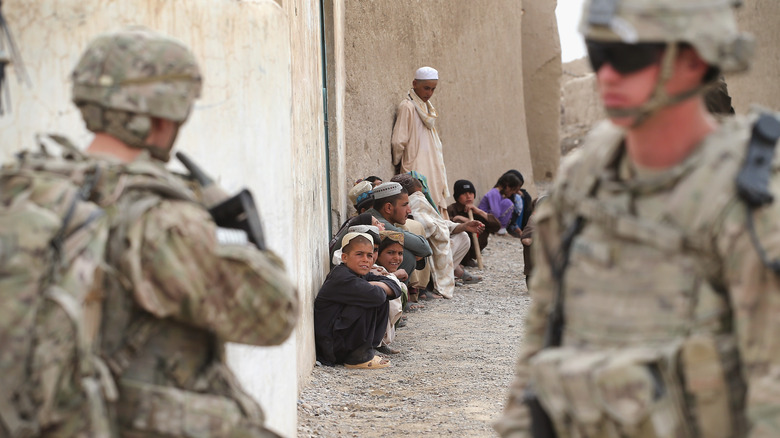Every Major Event The Oldest Living Person Has Lived Through
Japan is famous for its large population of centenarians. In 2020, according to the Japan Times, the island nation counted 80,000 centenarians among its rapidly aging population. Among these centenarians are a cohort of "super-centenarians," people that are 110 or older. Supercentenarians can claim to have truly "lived life." They have lived through/survived the 20th century's most horrific, iconic, and beautiful moments.
According to CNN, 119-year old Kane Tanaka, born on January 2, 1903, who holds the Guinness World Record for the oldest person, falls into this category. Kane Tanaka has seen Japan transition from an imperialist, aristocratic colonial power to a democratic and technologically advanced state. Many key moments of the 20th century have affected her country — or even her personally — in unexpected ways that are not in the history books. It is impossible to do justice to her entire life. Thus, here are some interesting and significant events both from Japan and elsewhere that the world's oldest person lived through and witnessed, ranging from bloody wars to sporting events that sought to achieve peace through athletic competion.
The Russo-Japanese War
Kane Tanaka was born on the eve of Japan's first major international conflict, the Russo-Japanese War. According to the Japanese Declaration of War against Russia, the dispute stemmed from colonial clashes in East Asia. Britannica notes Japan, the only non-European colonial power, had expansionist ambitions in Korea. Meanwhile, Russia capitalized on Chinese political instability to annex Manchuria, which Japan also coveted. Accusing Russia of encroachment on Korea, the imperial government declared war in 1904 after negotiations collapsed.
The journal Acta Asiatica Varsoviensa, notes that Japan was in an excellent position to fight. It secured funding from American financier Jacob Schiff and promptly went on the offensive against unprepared Russian forces. According to the U.S. Department of State, Japan defeated the tsarist forces at Mukden and expelled them from Manchuria, albeit at the cost of 41,000 men. At Tsushima, the Japanese navy under Admiral Togo Heihachiro crushed the Russian Baltic Fleet, which had sailed all the way from Latvia and around Africa to relieve their besieged compatriots in the city of Port Arthur. With Russia humiliated and Japan sustaining heavy losses, the warring countries opted for a negotiated solution.
In 1906, with the mediation of U.S. president Theodore Roosevelt, Japan and Russia signed the Treaty of Portsmouth. The agreement, which won Roosevelt the Nobel Peace Prize, ceded Southern Manchuria to Japan and confirmed Japanese possession of Korea. For Russia, the war was a disaster. According to the BBC, the costs of war exacerbated social tensions in Russia, which led communists to launch their first attempt at revolution in 1905.
World War I
According to American Diplomacy, the 20th century holds the dubious title as history's most destructive, thanks in no small part to the First World War (a.k.a. the "Great War"). The war had a plethora of causes, but the spark that lit the powder keg was the 1914 assassination of Austro-Hungarian archduke Franz Ferdinand during a visit to the Bosnian capital of Sarajevo. While the details of the European theater of World War I are well-known, Japan's role in the war is more obscure, but significant nevertheless.
According to the University of Kansas, Japan aligned itself with the Triple Entente (U.K., France, Russia) against the Central Powers (Germany, Austria-Hungary, and the Ottoman Empire), honoring the Anglo-Japanese alliance of 1902. Now, why did distant Japan involve itself in a mostly-European war? It was the perfect opportunity to seize German territory in the Asia-Pacific region. Japanese and British colonial forces drove the Germans out of their Chinese concession (explained in Foreign Affairs) and occupied Germany's undefended Pacific colonies, such as the Northern Mariana and the Marshall Islands. After conquering Germany's Pacific possessions, Japanese ships fought in the Mediterranean losing one destroyer to an Austro-Hungarian U-boat.
When the war ended in 1918, Japan had expanded its Pacific empire and tightened its grip on China. But it did not get its biggest desire, recognition of racial equality between Japan and Europe through the League of Nations. Woodrow Wilson and several European countries torpedoed the amendment, which did not receive the anonymous approval required to pass.
The Bolshevik Revolution
After the botched 1905 Russian Revolution, the perpetrators fled the country to plot their next attempt, which presented itself during World War I as Russia's economy broke down from the stress of war. According to Britannica, Alexander Helphand, a key figure in the 1905 revolution, approached German Kaiser Wilhelm II with a bargain described in "Devastation, Volume I: The European Rimlands 1912-1938": If Germany could smuggle fellow revolutionary Vladimir Lenin into Russia to seize power, Helphand would ensure Russia's exit from the war.
The bargain worked. Lenin's Bolsheviks seized power in 1917, pulled Russia out of WWI, and executed the imperial family in a grisly scene described by executioner Yakov Yurovsky. According to the book "Lenin's Heist," the Bolsheviks then proceeded to plunder Russia's churches, massacre their faithful, and auction their valuables through Swedish banker Olof Aschberg to finance their revolution. When Lenin died in 1924, the ECR Party notes that his regime had murdered at least 3 million innocents in addition to the deaths from civil war, starvation, and disease.
In Japan, the Bolshevik Revolution initially found sympathy. Socialist publication Jacobin Magazine notes that aristocratic Japan should have logically opposed Bolshevism. But Japan's cold relations with Tsarist Russia generated little compassion for the Romanov family, which was perceived as corrupt and autocratic. Instead, Japanese corporations eagerly approached the newly-minted Soviet Union with offers of Siberian investment and economic development. But once communism began undermining Japanese rule in China and Korea, Japan cracked down, allowing the conservative military factions to take power in the 1930s.
The 1918 flu pandemic
As if the horrors of World War I and communism were not enough, the world suffered another disaster, the so-called "Spanish Flu" of 1918. According to the National Bureau of Economic Research, this pandemic killed at least 40 million people, with particularly horrific losses in India, Russia, and China. According to Historic UK, When the pandemic began, the European press generally censored coverage to avoid loss of morale among soldiers in the trenches. But tired, disheveled soldiers in dirty, rat-infested trenches were the perfect incubators and "super-spreaders" of the disease. When the war ended, homebound soldiers spread the disease to virtually every inhabited corner of the globe as governments attempted to stem the spread through health precautions (e.g. the Italian health notice pictured above). There was only one reported refuge – the Brazilian island of Marajo.
For a young Kane Tanaka and her fellow countrymen, the flu pandemic was likely a cause for concern. According to Japan Today, this disease, originally called the "sumo cold" after it claimed a contingent of sumo wrestlers in Taiwan, was quite lethal by modern standards. According to the Journal of Emerging Infectious Diseases, the death rate among infected, previously healthy young men that filled the ranks of the Japanese military reached heights of 8%, a rate unheard of in the developed world today. Japan suffered nearly a 40% infection rate and over 400,000 deaths.
Discovery of penicillin
The 1918 flu was particularly lethal because sick patients, according to the NIH, often developed (then) untreatable bacterial pneumonia. But there was hope on the horizon thanks to a fortunate accident and one man's astute observation. According to the Singapore Medical Journal, English scientist and doctor Alexander Fleming had already made history with his discovery of lysozyme, an enzyme that inhibited bacterial growth in mucus. One day, while researching staphylococcus bacteria, he left an uncovered petri dish containing bacterial colonies on a windowsill. Naturally, it became contaminated with mold. But instead of throwing it away, Fleming made an observation that would change the course of medicine: The staphylococcus bacteria were not growing in the contaminated areas. He had just discovered the antibacterial properties of penicillin mold.
The significance of Fleming's discovery initially went unnoticed. His fellow scientists noted that the production of sufficient quantities of penicillin secretion to treat bacterial infections in humans was too time-consuming and costly. But when English and American scientists, backed by the U.S. government, discovered how to manufacture it at an industrial scale, it became a game-changer, nothing short of a medical miracle according to the American Journal of Public Health. Clinical trials in 1944 confirmed its safety and efficacy in humans and it became available for civilian use in 1945, spawning a new class of medicines today known as antibiotics.
First World Cup
Not everything about the 20th century was death and destruction. This era also saw the birth of international sporting events, such as the modern Olympics, reestablished in 1896 (via the National Hellenic Museum) to foster brotherhood and peace between nations through sport. Less known, however, is the history of the biggest global sporting event: the FIFA World Cup, which celebrated its first edition in 1930.
According to FIFA, 13 teams from the Americas and Europe traveled to Montevideo, Uruguay to compete for the title of world champion. According to Football History, FIFA had anticipated greater participation, but the Great Depression made transatlantic travel a pipe-dream for European squads. Since many European players were amateurs with full-time jobs, it was unfeasible to take a month-long absence amid high unemployment back home. Nevertheless, the tournament was a huge success. The final between hosts Uruguay and neighboring rival Argentina attracted a fanatical crowd of 80,000 fans. To the delight of the home crowd, Uruguay (pictured above) won 4-2, becoming the first World Cup champions.
The World Cup did not go truly global until much later. Most of the world was colonized by European countries and did not send teams, but there were early pioneers of African and Asian participation, such as Egypt in 1934 and the Dutch East Indies in 1938. Japan did not enter the scene until the 1990's when according to the CSM, the country campaigned to raise the sport's profile. The country finally qualified in 1998 to the delight of its fans.
World War II
World War II is by far the most destructive war in human history. According to the National WWII Museum, at least 70 million people perished from fighting, disease, and genocide, while many more became refugees. Japan joined the Axis with the Tripartite Pact of 1940 and as an ally to Italy and Germany. Japan's main theater of war, however, was against the United States in the Pacific, whereas Germany and Italy primarily fought against the USSR. But in 1945, according to the National WWII Museum, 1.5 million Soviet troops invaded Japanese Manchuria in violation of previous neutrality agreements. At this point, the war became personal for Kane Tanaka, whose son happened to be stationed on the front lines as the Soviet juggernaut threatened to steamroll Japanese positions in Manchuria.
Caught between the United States and the Soviets, the Japanese war effort crumbled. Around 1.7 million Japanese soldiers surrendered and the Red Army broke civilian resistance through mass rape, a tactic that had broken Germany and its allies' will to resist too. The POWs soon came face-to-face with Stalin's gulag. At least 300,000 Japanese soldiers were deported to join their former allies in Soviet labor camps. According to The Times, Tanaka's son was among them. He spent two years in Soviet captivity, and he was one of the lucky ones. While he was released in 1947, around 46,000 of his countrymen along with numerous Italians, Germans, and others never returned home.
Hiroshima and Nagasaki
According to the National Park Service, the Second World War ended as a result of the United States using a new and destructive weapon – the atomic bomb – on the Japanese cities of Hiroshima and Nagasaki (pictured above). President Harry Truman argued that targeted use of nuclear force was preferable to "Okinawa from one end of Japan to the other." In the Battle of Okinawa, U.S. troops had suffered 35% losses, and Truman did not want to repeat this in a ground invasion of Japan.
According to Atomic Heritage, however, a revisionist school has proposed that the Soviet invasion of Manchuria ended the war, not American nukes. Under this interpretation, Japan would likely have surrendered without the atomic bomb just to avoid a brutal Soviet occupation that would have communized Japanese society and government at the aristocracy's expense. Thus, if this is true, it would, as noted in the Boston Historical Society Bulletin, suggest that the United States used nuclear weapons on Japan to intimidate its Soviet enemy, America's principal rival in the post-war world. This is, however, a debate tinged with political and nationalistic undercurrents.
It is unclear if Kane Tanaka was directly affected by the atomic bomb. But media outlets such as the Italian newspaper Unione Sarda claim that she survived "the effects of the Nagasaki bomb." This suggests that even if she did not live in Nagasaki at the time, she would have been close enough to risk the effects of nuclear fallout, namely leukemia (via Columbia University).
1949: The year of shocks
In 1948, Americans could rest easy. World War II was over and the United States dominated the world as the only nuclear-armed superpower. That changed in 1949 when two events, both involving Japan, shook the American public's confidence in their security. According to History, U.S. geologists recorded seismic activity from inside the Soviet Union indicative of an underground nuclear test. The Soviets, wary of Japan's fate, had created their own nuclear deterrent. The Wilson Center notes that although the Japanese press had censored the full effects of the nukes on Hiroshima and Nagasaki, the visiting Soviet delegation would have personally witnessed their horrific results. Such a destructive weapon could not be left in American hands. It threatened the USSR's existence. So, to obtain political parity with the U.S. and security, the Soviets needed their own bomb. With help from American spies Julius Rosenberg and David Greenglass, they succeeded.
Global communism notched a second triumph when Mao Zedong's forces (pictured) defeated the Chinese Kuomintang Nationalists and aligned China with the USSR. According to the South China Morning Post, Mao's victory, per the Chinese premier's own words, stemmed in part from the "great favor" of Japanese intervention. Mao's Nationalist enemies were left to fight the Japanese while the communists regrouped and bided their time. Once the war ended, Mao's emboldened communists routed the war-weary Kuomintang and created the People's Republic of China. America had lost its status as the sole superpower and one of the world's largest and most important countries had fallen to communism.
The moon landing
The late 1950s and early 1960s saw the Cold War enter the final frontier as the U.S. and the USSR raced to reach outer space. The USSR won the first two legs, successfully launching the unmanned Sputnik Satellite in 1957 and the Vostok-1 in 1961 (via NASA). Vostok-1's pilot, Yuri Gagarin, became the first man in space, one month before American Alan Shepherd.
According to the Houston Space Center, President John F. Kennedy challenged America's scientists to put a man on the moon by the end of the 1960s. In his 1962 speech at Rice University, Kennedy appealed to the American public to throw its financial support behind the Apollo program. America, he argued, never backed down from challenges, which kept the country on a steady march towards scientific and technological progress. Going to the moon was a goal to aspire to because "it [was] hard" to achieve.
Kennedy's vision of American space exploration did not die with his 1963 assassination in Dallas. On July 16th, 1969, the Apollo 11 mission carrying Neil Armstrong, Buzz Aldrin, and Michael Collins blasted off from the Kennedy Space Center at Cape Canaveral, Florida towards the moon. After four days in flight, Aldrin and Armstrong became the first men to land on the moon, a glorious milestone by any metric. Although the United States had triumphed in the Space Race, Armstrong famously declared it a victory for humanity, or in his words, "one small step for [a] man, one giant leap for mankind."
Fall of the USSR
The Soviet Union's 1991 dissolution came after a gradual loss of influence and prestige during the 1980s. University of Washington professors Rafael Reuveny and Aseem Prakash note multiple factors, including a stagnating, centrally-planned economy that stifled innovation, President Mikhail Gorbachev's liberalizing reforms, and the overlooked 10-year Soviet war in Afghanistan, a costly defeat.
According to Reuveny and Prakash, the Soviet withdrawal from Afghanistan signaled to the Baltic independence movements that Moscow had neither the capability nor the will to suppress dissent anymore. According to Russia Beyond, once it became known that the USSR had signed the secret Molotov-Ribbentrop Pact with Hitler's Germany back in 1939 to annex the Baltic, over 1 million Estonians, Lithuanians, and Latvians formed a human chain called the Baltic Way (pictured above) in protest. They declared Soviet rule an illegal occupation, making Soviet law null and void. The three republics seceded in 1990.
Baltic secession set off a cascade of anti-Soviet independence movements (via BBC), but according to the Moscow Times, nearly 77% of voters in the remaining republics voted to remain Soviet. But Boris Yeltsin, president of the Russian SSR, banned the communist party and liquidated its assets. Without its largest constituent, the USSR was on life support. The final blow came in when Ukraine, Russia, and Belarus dissolved the union with the Belavezha Accords. On Christmas Day of 1991, Gorbachev resigned the presidency and the red star fell, replaced with the Russian tricolor.
The Global War on Terror
The conflict known as the "Global War on Terror" has defined the lives of the post-9/11 generation, who have not lived in peacetime America. According to the George W. Bush Presidential Library, the conflict officially began to bring the perpetrators of 9/11 to justice. But the war would not end "until every terrorist group of global reach [had] been found, stopped, and defeated." Critics across the political spectrum, from the liberal Vox to Republican Congressman Ron Paul have noted that without clear, bounded objectives, the GWOT is virtually unwinnable. Twenty years and trillions of dollars later, the U.S. has nothing to show other than a profiteering bureaucracy and corporate-political class.
The U.S. general Smedley Butler wrote in 1935 that all "war is a racket." His words ring truer than ever regarding the GWOT. A 2014 Al Jazeera article noted that members of the Bush cabinet (including Vice President Dick Cheney), the defense industry, Congress, and the Pentagon all had financial incentives to prolong the GWOT. Military contractors gained lucrative defense contracts, politicians profited from investments in these companies, and the Pentagon got a budget increase. The mainstream media and the tech companies, according to the Ron Paul Institute, eagerly beat war drums.
Meanwhile, the GWOT has ushered in new and intrusive curtailments of Americans' civil liberties through a broad definition of "domestic terrorism" (via the ACLU).
